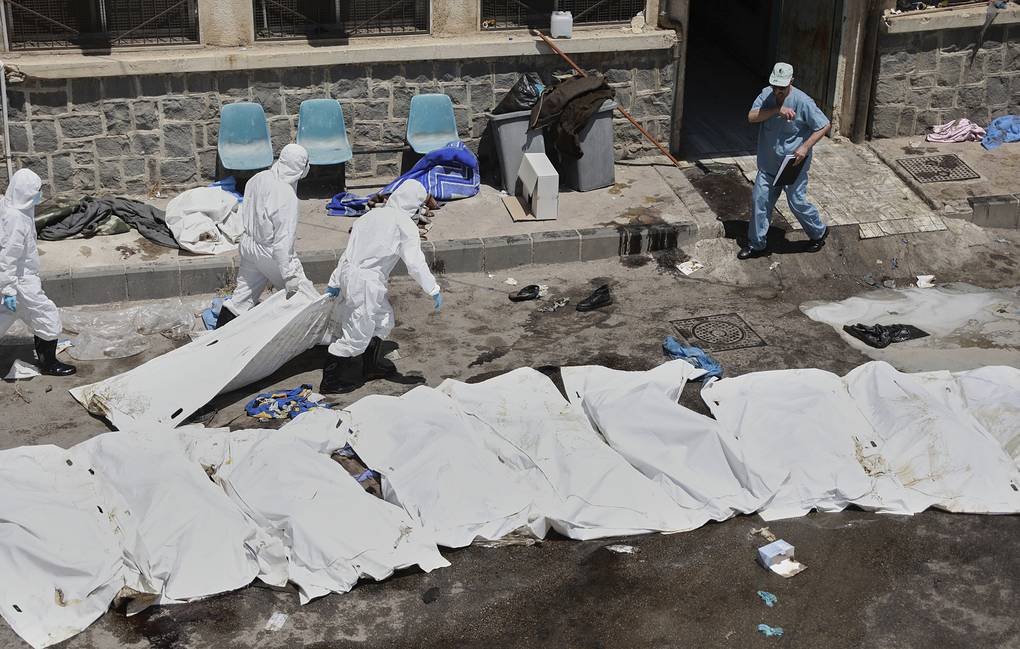Press review: West promises arms to Kiev before Moscow talks as Syrian Druze face threats
Top stories from the Russian press on Tueday, July 22nd
MOSCOW, July 22. /TASS/. Ukraine is being supplied with weapons ahead of the next round of talks with Moscow; Russia, China, and Iran align stances ahead of talks with the Eurotroika; and Druze still face threats in Syria. These stories topped Tuesday's headlines across Russia.
Izvestia: Why Kiev is being pledged arms ahead of talks with Moscow
Serious differences on the political settlement of the crisis remain between Russia and Ukraine, Rodion Miroshnik, the Russian Foreign Ministry’s ambassador-at-large in charge of overseeing the Kiev regime’s crimes, told Izvestia. Vladimir Zelensky announced that the next stage of negotiations will be held in Turkey on July 23. Earlier, the US set a 50-day deadline for the end of the Ukraine conflict. That said, on July 21, the Kiev regime was promised a new package of weapons: following a Ramstein-format meeting, Western countries committed to providing additional funds to purchase drones and air defense means. On the same day, Paris announced the construction of a drone production plant in Ukraine.
"During the talks, we have at least two tracks — the humanitarian and the political one. As for the political track which involves radical steps, there are rather serious differences on both sides," Miroshnik told Izvestia. "That said, humanitarian programs are being implemented by everyone, they have been almost completed. The part that was agreed upon is being implemented," he added.
"From a medium-term perspective, Europe is unable to independently increase the volumes of delivered military-technical aid, it can increase the allocation of funds while military products mostly depend on the US, especially on such critical tracks as air defense," Miroshnik explained.
By announcing new supplies, the Kiev regime is laying the groundwork for the negotiations, researcher at the Institute of CIS Countries Alexander Dudchak told Izvestia. According to the expert, Ukraine believes that this way it is boosting its positions while such decisions are unlikely to affect the Russian delegation which clearly understands its goals.
Media: Russia, China, Iran to agree stance ahead of talks with Eurotroika
Representatives from Russia, China and Iran will hold a trilateral meeting in Tehran on July 22 to discuss the threats by Western countries to reimpose sanctions against the Islamic republic due to its nuclear program. Iranian Foreign Ministry Spokesman Esmail Baghaei first announced this at a press conference on July 21, according to the Mehr news agency. Earlier, during a phone call, the leaders of the Eurotroika (Germany, France and the United Kingdom) in the presence of chief of EU diplomacy Kaja Kallas threatened Iran with returning to a harsh sanctions regime if no progress on the nuclear deal is made. Such an option is indeed provided for under the 2015 Joint Comprehensive Plan of Action (JCPOA) which expires on October 18. After this date, Iran will not be bound by any obligations on enriching uranium while European countries will lose the mechanism enabling them to introduce unilateral sanctions bypassing a vote in the UN Security Council, hence the rush, Rossiyskaya Gazeta noted.
In a conversation with Vedomosti, Yury Lyamin, a senior researcher at the Center for Analysis of Strategies and Technologies, noted that the Eurotroika’s threats to activate the mechanism is the abuse of this right as it was created in the event Iran breaches its obligations. "Yet it was fulfilling them until the US withdrew from the JCPOA and began introducing more unilateral sanctions."
Lyamin added that Russia and China have long been supporting Iran on this issue and the current talks will most likely develop a consolidated diplomatic and legal stance to be presented to the Eurotroika by Tehran. "Possibly, various future scenarios will be considered depending on further actions by the Europeans," he suggested.
Iran’s situation is tough, Vladimir Sazhin, Senior Research Fellow at the Institute of Oriental Studies of the Russian Academy of Sciences, commented to Vedomosti. According to him, in the conditions of the US and Israel’s belligerent attitude, Iran is facing talks with the Eurotroika which is threatening sanctions. However, despite the threats, as opposed to the US, the UK, France and Germany are still open to a compromise, Sazhin believes.
Russia and China are against Iran developing a nuclear weapon but do not want to impose any sanctions on it, recognizing Tehran’s right to peaceful nuclear development, and they intend to facilitate its dialogue with the International Atomic Energy Agency (IAEA), the expert added. "This is precisely why the Europeans are rushing the talks. In October, Russia will become the chair of the UN Security Council which may complicate the approval of anti-Iranian sanctions," he said.
Vedomosti: Druze still threatened in Syria
Within the framework of the July 21 ceasefire agreement, Syria’s government began evacuating the families of loyal to it Sunni Bedouins from Suweida in the country’s south where Druze reside, SANA reported. For over a week, clashes have been underway there between the so-called security forces of the new regime and Bedouins who support it, with the Druze religious minority.
Reports about the "calm" in Suweida point to a temporary easing of tensions but the conflict between the Druze and the Bedouin groups is still ongoing, believes senior researcher at the Center for Middle East Studies at the Institute of World Economy and International Relations Nikolay Sukhov. Statements by Syria’s new government contradict the reality on the ground and merely emphasize instability, the expert noted. "There is no information on the full withdrawal of Bedouin groups, the evacuation of families is a sign of a local truce, not of a full resolution," he explained.
Lyudmila Samarskaya, a research fellow at the Center for Middle Eastern Studies of the Institute of World Economy and International Relations, agrees that it is too soon to declare an end to the conflict in southern Syria. Although Israel has not launched any new strikes on Syrian targets since the ceasefire agreement, such actions remain possible, at least as a symbolic show of support for the Druze. "Israel’s strategy is a combination of diplomacy and force. The situation in Syria is viewed by Israel as potentially unstable, the support of Syrian minorities by the Israeli authorities is seen by them as the pragmatic choice even if results are unpredictable. This is how they are trying to prevent the weakening of non-hostile groups near their borders. This is why Israel insists on demilitarizing at least some part of Syria’s south," she explained.
Vedomosti: EU may conclude impractical trade agreement with US
The European Union (EU) is ready to approve a trade agreement which favors the US before the August 1 talks deadline when the Trump administration introduces 30% tariffs on European goods, informed sources told Bloomberg. Brussels wants to end the stalemate in trans-Atlantic relations and activate preparations for response measures in the event the agreement collapses. EU representatives will meet this week in order to shape a plan in the event the deal with Donald Trump fails. According to Bloomberg, so far, there has been no breakthrough in the talks.
German Chancellor Friedrich Merz, as a representative of the leading EU country with a significant say within the bloc, could not help but state his position on the issue of a standoff with the US, Artyom Sokolov, a senior researcher at the European Studies Institute of the Moscow State Institute of International Relations, said. The chancellor worked in various business structures for a long time and established ties with US enterprises and now hopes to use them in an attempt to reach an agreement with Trump on reviewing the restrictions. That said, the German leadership has no direct contacts with Trump or his team as previously, the German government was interacting either with Democrats or those Republicans who did not support the US president. As a result, the EU lacks any serious tools of pressure on Trump.
As for a potential agreement between Washington and Brussels, Trump may soften his radical stance and take more moderate steps with regard to the European Union, the expert believes.
Merz’s actions quite correspond to Trump’s logic, added Deputy Director of the Institute of Europe at the Russian Academy of Sciences Vladislav Belov. The German chancellor is basically signaling to the US president that he is not harshly criticizing his policy course. Trump is not Merz’s adversary but rather a competitive partner with his own logic and behavior which Merz’s team understands well. This is why, to prevent Trump’s displeasure, Merz is sending signals personally to him about his readiness for compromises. The expert believes that after all, Washington and Brussels will manage to agree on tariffs by August 1.
Izvestia: Consequences of absence of dialogue on Arctic between Russia, West
Russia is capable of resolving all issues on the Arctic independently, without Western countries, Russian Ambassador to Canada Oleg Stepanov told Izvestia. Moscow may get friendly countries involved. Cooperation here is mostly focused on transport logistics and energy, experts told the newspaper. For example, China and India are already establishing supplies over the Northern Sea Route. ASEAN countries, including Vietnam, Thailand and Indonesia, are also interested. Meanwhile, the region is being gradually militarized, with the Arctic Council almost paralyzed. With Finland and Sweden joining NATO, Ottawa intends to turn the northern region into an arena of a standoff with Russia, the envoy emphasized.
Potential cooperation with friendly countries here is focused mostly on logistics and energy, Nikita Lipunov, junior researcher with the Institute for International Studies at Moscow State Institute of International Relations, told Izvestia. This, above all, involves China which is interested in transporting cargo over the Northern Sea Route. Beijing considers it the most important direction for the development of its global Belt and Road initiative. The linking of transport routes will let China increase its influence on world trade.
"The risks of militarizing the Arctic certainly exist but, most likely, not in the near future, this is something to be gradually explored. Any sudden tensions in the region are unlikely. But there, it’s every man for himself," Roman Plyusnin, research fellow at the Center for Nordic Studies of the Russian Academy of Sciences’ Institute of Europe, told the newspaper.

